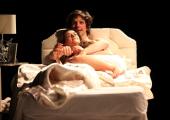Precocity of Vice: 'Tis Pity She's a Whore returns

The notorious play has been revived, but is it really so very beastly?
John Ford’s tragedy‘Tis Pity She’s a Whore, set in the Italian city of Parma, tells the story of a young brother and sister, Giovanni and Annabella, who discover a mutual love for each other and embark on a passionate sexual relationship. The challenges of family, church and society increasingly curtail their freedom to pursue their desires, and the play culminates in a terrifyingly brutal and bloody climax. When Ford wrote the play, probably in the late 1620s, he was in his forties and was nearing 50 when it was published in 1633. The play is so often talked about as if the work of a rebellious, youthful writer, keen to shock, whereas it is more accurately viewed as a considered portrayal of a complex sexual relationship by a mature author. It is revived this week by West Yorkshire Playhouse.









